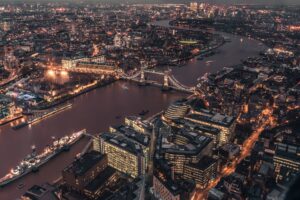
By Mert Kul, Politics Editor and History student at King’s College London
Parts of England’s complicated local government system, including 143 councils and 13 directly- elected regional majors, are coming up for re-election this Thursday as part of the UK-wide Local Elections. This includes London, with 25 London Assembly seats up for grabs as well as the Mayor of London job. It will be a decisive moment for the city as it seeks to restore its economic and cultural prominence as a global capital after the COVID Pandemic and become a leader on the growing issue of climate politics in the coming decades. It is also a chance for millions of Londoners to vote on how to fix the chronic issues of violent crime, unaffordable housing and public transport that have for years afflicted the capital arguably more than anywhere else. Below are the key proposals from the four parties that got the biggest chunk of the previous ballot.
Economic Recovery and Jobs
Labour’s incumbent Sadiq Khan has committed to financing transport and green infrastructure projects such as Crossrail 2. This is in conjunction with his pledge to support SMEs to start up and scale up along the lines of his London Business Hub, with advisors in centres across London Boroughs, along with continuing the various funds that have provided grants and loans for struggling businesses during the Pandemic. Support for London’s burgeoning cultural and arts sectors is also promised, with a new Museum of London in West Smithfield, more film studios established through the Film London agency such as one in Dagenham and an International Centre for Creative Industries.
Data and connectivity also occupy a significant of his focus, with a commitment to rebuild the London Datastore to be the central register linking data across the city as well as creating a new Emerging Technologies Charter to manage the deployment of devices arising from 5G and artificial intelligence. He has also committed to using new planning powers to ensure full-fibre broadband connectivity in every new development. Khan has also made proposals for doubling the size of the green economy by 2030 by supporting a green skills academy for new green jobs and apprenticeships.
The impact of the Pandemic is on the already declining high street footfall and on the agenda with a commitment to expand the Night-Time Enterprise Zones programme, first piloted in Walthamstow, supporting the trials of night-time markets, longer opening hours, or helping shops and hotels host cultural events. This is in response to research that revealed 92% of councils in England believe that the night-time economy could be crucial in preventing the decline of the high street.
More widely, he has put a lot of emphasis on lobbying the national Government over business and employment support, wanting to see the Furlough scheme evolve into a national jobs guarantee, providing a return to employment and the possibility of training and apprenticeships for young people. He also pledged to put pressure on the Government to acquiesce to London’s dominant financial and professional services sector with a bespoke EU services deal as well as for devolved powers on London visas which include the ability to create a shortage occupation list for the city. He has also committed to pushing the Government to extend the business rates holiday and VAT reductions for hardest-hit sectors, arguing that the threshold should thereafter be raised to account for the higher cost of property in London to secure the devolution of business rates eventually.
This is one of the only areas of agreement with his Tory challenger Shaun Bailey. Bailey claims his programme will create 924,000 jobs over 5 years, through the combination of his housebuilding program, the commitment to spend at least 50 per cent of economic development funding on the green economy and injecting up to £10.9bn of capital investment through his new London Infrastructure Bank to fund long-term transport projects. Bailey has prioritised investment in London’s medicine and life science sectors, promising a fivefold increase in funding for MedCity.
On the high street, Bailey has pledged a £9m High Street Recovery Fund and a new West End Weekend Pass for one weekend in 2021, a weekend-long travelcard that allows the free use of the transport network from all zones.
The Green Party candidate Sian Berry, who finished 3rd in the last election, has put less emphasis on growing the size of the economy but making it more sustainable and ethical. There is a commitment to the circular economy, with the creation of green jobs to make, reuse and repair more local goods and services. She has also pledged to open up opportunities for young people with a trial of a Creative Autonomy Allowance – a regular income to support up and coming careers in business and the arts. She has also committed to establishing a new London Living Wage at £14 an hour and flexible, family-friendly standards for employers to meet. She has additionally committed her support for the freedom of movement of EU citizens into the London economy.
Luisa Porritt, the new candidate for The Liberal Democrats who finished 4th in the last election, covers similar ground to the Labour and Conservative proposals on the high street and business support, establishing a ‘Reinvent The High Street Taskforce’ to gather data and provide technical and financial support for local projects as well as setting up a new London Apprenticeship hub. While she also agrees on an extension to business rates relief and long-term reform to the rates system, the Lib Dems also commit to campaigning for a rent relief fund to help small businesses clear the debts piled up during the Pandemic. They are also supporting a London trial of a Universal Basic Income along with the Greens, which would mean a guaranteed wage for essentials regardless of employment status.
Transport
There are also significant divisions on Transport policy, with Sadiq Khan firmly pinning the blame on central Government and Boris Johnson’s record as London Mayor for the financial blackhole Transport for London (TFL) finds itself in. He has pledged to continue campaigning for the restoration of sufficient Government funding for TFL, and the devolution of new funds to London, as well as for the £500m of Vehicle Excise Duty (VED) raised in London to be devolved and spent on London roads. The Conservatives blame Khan’s financial mismanagement and commit to introducing commercial sponsorship for the tube, similar to the Santander bike-hire scheme, as well as ending ‘gold plated’ TFL pension plans. Bailey has argued this will raise enough revenue to protect the services Londoners rely on — including free travel for under-18s and over-60s, something which Khan has also committed to protecting. There is also a commitment to ‘immediately’ reopen the Waterloo and City line and Night tube and reinstate all bus routes in outer London by the end of his first term.
The Conservatives have made a push on their traditional territory of lowering taxes, with a pledge to reverse the congestion charge hike, now up to £15 a day, scrap the ULEZ extension scheduled for October 2021 as well as exempting motorcycles and all disabled drivers and their carers from the central ULEZ. There is also a commitment by both Labour and the Conservatives to expand the residential electric vehicle charging network five-fold, with over 40,000 new chargers. The Greens want to flatten fares and create a single zone for tube and rail, which will start by merging zones 4, 5 and 6 by 2024, with a flat fare system by 2030. There is also a commitment to making all transport in London zero carbon and non-polluting by 2030.
The Lib Dems have committed to introducing flexible travel cards so those part-time commuters can opt for a discounted four-day-a-week pass in the post-pandemic world of increased home working as well as establishing a new smart road charging scheme. They have pledged to support the pedestrianisation of Oxford Street and the partial pedestrianisation of Parliament Square. They also want to scrap the polluting Silvertown Tunnel along with the Greens – calling it the ‘Mayor’s dirty little secret.’ Khan does not mention the Tunnel anywhere in his manifesto.
The four parties also contest the issue of Airport expansion. With Khan opposing plans for a third runway at Heathrow along with the Conservatives, as well as an expansion of flights at City Airport. However, the Greens and the Lib Dems, who oppose all airport expansion in London, point out that Khan has supported the expansion of Gatwick.
Also, parties are united in committing to significantly increased funding for walking and cycling networks throughout the city and greening the London bus fleet. The Conservatives have pledged a zero-emission bus fleet by 2025, while the Lib Dems and Greens commit to all London’s buses becoming electric or hydrogen by 2028 and 2030 respectively. Khan has also committed to trying to bring forward the TFL’s current target for this from 2037 to 2030.
They are also united in pledging funding to repair Hammersmith Bridge.
Housing
Sadiq Khan has set a target of 10,000 new council homes to be built, with the majority of homes at social rent and up to new space, safety and quality standards. This will include more genuinely affordable homes on surplus public land, and maximise the number of these homes being built on land owned by the GLA. He has also committed to pushing the Government to devolve new ‘use it or lose it’ powers so that developers don’t speculate on land and build new homes that they already have planning permission for. He has also said he will push the Government to give London the powers to set up a system of rent control in the private sector, something supported by the Lib Dems and Greens and opposed by the Conservatives, who claim it would reduce the number of homes for rent and reduce the quality of rented flats.
On the controversial topic of shared ownership schemes, Khan has pledged that new shared- ownership homes will come with 999-year leases along with a pilot for a commonhold scheme. There is also a commitment to work with council and housing association landlords to reduce the charges leaseholders face.
Shared ownership forms the central plank of the Conservative program for housing, with their pledge to build 100,000 homes and sell a percentage stake in them for £100,000 each under a new Housing for London (HfL) department. This will allow deposits as low as £5,000 and be met with an accompanying expansion of deposit loan providers. Bailey has also committed to ensuring that half of the affordable homes provided through HfL and GLA funds will be designated for London’s key workers.
This is echoed in Green plans to bring more homes under the control of Londoners, with new investment to acquire homes for key workers at a London Living Rent, and more support for co-operative and community-led housing. There is also a commitment to prevent homelessness by cancelling the rent debts built up during the Pandemic.
Liberal Democrat proposals include setting up a London Housing Company, which will reinvest any profits back into genuinely affordable homes, and bring empty homes and offices back into use after lockdown measures end as ‘quality, affordable, zero-carbon homes.’ The Lib Dems and Greens have also committed to introducing a Housing First approach to homelessness where housing is seen as a human right above all.
Homes for the homeless is something all the parties agree on, with Khan promising at least 1,000 new homes to allow rough sleepers to move on to more settled accommodation. Under Bailey, himself a former rough sleeper, the Conservatives have also pledged to direct a portion of Hfl funds towards supplying accommodation for homeless people with complex needs as well as creating mobile Mental Health Intervention Teams to help support rough sleepers off the streets. Bailey has also committed to establishing a permanent emergency housing safety net by partnering with hotels across London to maximise the use of empty bed spaces. He has promised an additional crackdown on empty ‘ghost homes’ that are left empty through issuing more Empty Dwelling Management Orders (EDMOs).
All parties have committed to funding more renewable energy, particularly investing in solar power installation for residential homes. All parties apart from the Lib Dems have pledged to protect and expand the greenbelt and all apart from the Conservatives have promised to implement the safety recommendations of the Grenfell Tower inquiry.
Crime
The issue of fighting crime is perhaps where there exists the biggest discrepancy between the parties on the left and the Conservatives, who favour heavier law enforcement. Khan has committed to lobbying the Government for an additional 6,000 officers, with the agreement of the Metropolitan Police Commissioner, to increase neighbourhood policing in high crime areas and town centres. Khan has also argued that Council tax increases are worth it to pay for this. Bailey has again put this down to Khan’s alleged financial mismanagement, pledging to scrap the 10% proposed increase in council tax and freeze it for the remainder of his term, instead using additional Home Office funding and long-term savings at City Hall to secure 8,000 extra police officers for London. He has also said he will use revenue from the Mayor’s Infrastructure Levy to reopen 38 police stations shut under Khan and set up a new youth centre in every borough, hiring 4,000 new youth workers. The Lib Dems have echoed this proposal by committing to reopen as many of the closed police stations as possible while expanding neighbourhood policing through increasing the number of Community ward officers.
The Greens and the Lib Dems have both committed to end the use of Section 60 stop and search allowed without reasonable suspicion and block the rollout of facial recognition technology due to strong racial disparities in its application. In contrast, the Conservatives under Bailey have pledged to implement Operation Blunt 3, including increased frequency of patrols in crime hotspots and more intelligence-led stop and search. He has also committed to rolling out new infrared scanning technology to detect concealed weapons in large crowds and busy transport hubs.
This difference in approach is also reflected in drugs policy. Khan has committed to establishing a London Drugs Commission comprising independent experts that will develop recommendations, particularly on cannabis use. The Lib Dems and Greens have taken a firmer stance on the issue, encouraging the Metropolitan Police to use its discretion to decriminalise the possession of cannabis effectively. The Lib Dems have promised to continue to campaign for a legal, regulated market for cannabis. In contrast, the Conservatives have proposed a new Mayoral Drug Testing Charter, asking all businesses with over 250 employees to conduct regular anonymised drug tests voluntarily. An annual league table will be published showing which companies have the highest and lowest rates of drug use.
All parties are committed to providing young people with recreational, professional and sporting services within their local communities to prevent criminality by creating youth zones or the London Youth Service, which the Lib Dems have championed. They have also committed to extending the ‘Rail to Refuge’ scheme permanently across Transport for London, providing free train travel for victims of domestic abuse.
This is not an exhaustive list of proposals, with more detail available in each of their manifestos, particularly on youth development policies and mental well-being. Yet it does illustrate the various directions London could take during the next five years. It is now not long before we find out which one Londoners have chosen.
Exclusive Offer: Get £100 off your Summer Internship Experience at Amplify Trading by clicking here or using our unique discount code at the checkout: MSAmplifySummer2021. Participants graduate from the course with a Diploma from the London Institute of Banking & Finance. For more information about the course, click here.

Contributor to The London Financial
We combine research produced by students and early professionals into a single website, breaking down the barriers to entry individuals face in a number of industries.
Contributor opinions are their own and do not necessarily reflect the stance of the LF.
